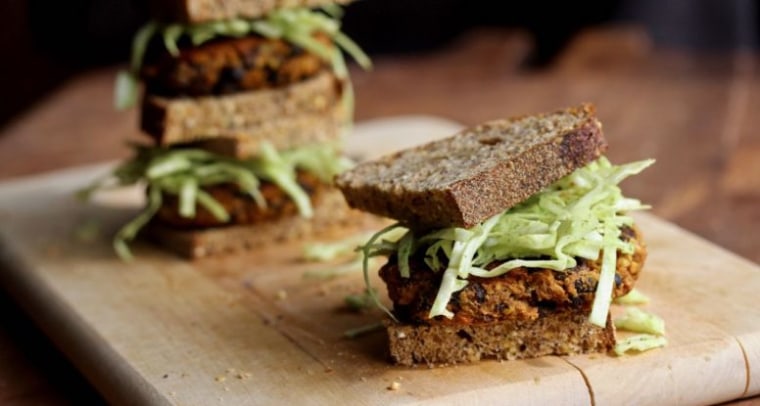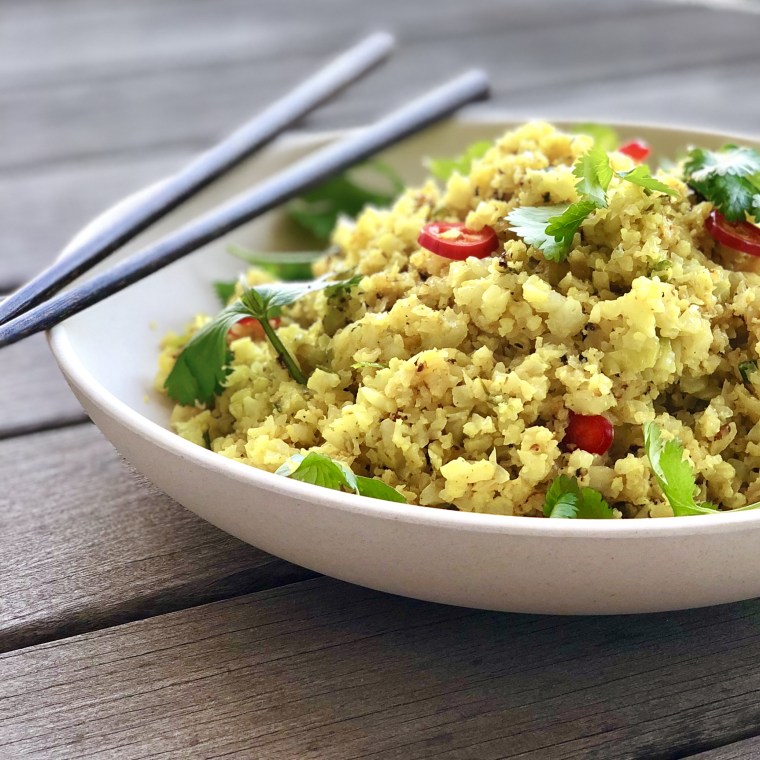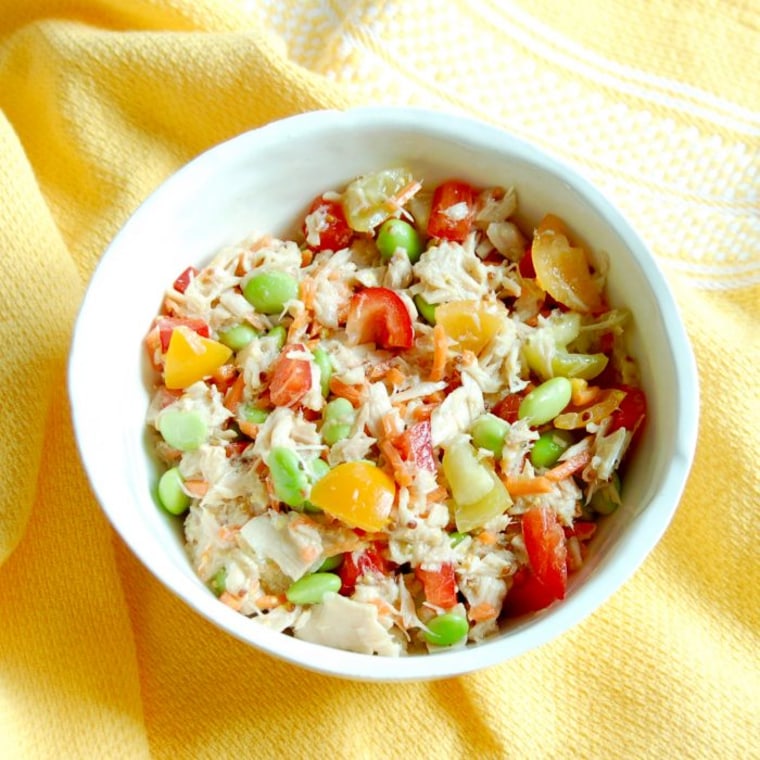Fresh food gets all the love, but canned food is worthy of praise, too. The canning process, which has been used to preserve food for centuries, keeps food safe and nutritious until consumed, which not only cuts back on food waste, but also means your pantry holds a treasure of quick meal solutions. I asked the nation’s top food and nutrition pros for their favorite canned goods, but before you get a sneak peek into their pantries, here are a few pointers for selecting the most nutritious canned foods.
- Choose lower sugar and lower sodium versions. Ideally, you’re looking for foods with no added sugar or salt, but it’s okay if canned soup has a little of each.
- Look for BPA-free can linings. Though cans are made with steel, their linings are often made with a substance that contains BPA, an industrial chemical. Though the FDA deems this substance safe for now, other health groups raise red flags. Even private label brands offer BPA-free can linings so it won’t be hard to avoid this potentially harmful substance.
- Steer clear of canned foods with artificial preservatives and ingredients. This isn’t hard to do, since canning is a food preservation technique.
1. Canned pumpkin
Though canned pumpkin might seem like a seasonal item, dietitians turn to it year-round. “I stock my pantry with canned organic pumpkin throughout the year to incorporate into smoothies, treats and even savory dishes, like pumpkin hummus and soup,” says Cynthia Sass, RD, a NYC- and LA-based performance nutritionist.
Sass makes this one of her top canned choices because it’s loaded with nutrition. “One half cup of pumpkin puree packs nearly 400 percent of the daily recommended target for vitamin A. This key nutrient and antioxidant supports immunity, lung, eye and skin health, and has been shown to protect against cognitive decline. The fiber in pumpkin supports digestive health and bowel regularity, boosts fullness and helps control blood sugar and insulin regulation, which makes pumpkin a great pre-exercise fuel. Pumpkin also supplies bone boosting vitamin K, immune-supporting vitamin C, and muscle- assisting potassium. It's a powerhouse pantry staple.” she explains.
Sara Haas, RDN, author and culinary nutritionist based in Chicago, Illinois is another pumpkin lover. “Beyond it's obvious uses for quick breads, pancakes and other baked goods, I love to use it an as an earthy addition and binder in veggie-based burgers. It's also delicious when cooked low and slow with broth and seasonal aromatics, and finished with a (tiny) touch of cream as a flavorful sauce for whole grain pasta.”

2. Beans
If you can open a can, you can punch up the protein and fiber in salads, pasta dishes, soups, and even sweets using canned beans. Tamara Duker Freuman, NYC-based dietitian and author of "The Bloated Belly Whisperer" says they’re her hands-down favorite. “Canned beans form the basis of the three easiest, fastest and cheapest weeknight family meals in my repertoire. Canned black beans doctored up with some cumin and oregano are the basis of a Mexican-style bowl I serve with brown rice or quinoa, avocado and other toppings; canned cannellini beans are the star ingredient of a quick white chili I make with ground turkey, onions and garlic; and I mix canned chickpeas with a jar of Indian-style simmer sauce or pre-mixed spice blend for a quick South Asian curry, served with rice, plain yogurt and a cilantro garnish.”
Brooklyn, NY-based nutrition and wellness expert and author of "Eating in Color," Frances Largeman-Roth, RDN is also on board with canned beans. She keeps her kitchen stocked with a few cans of black beans. “I use them for everything from weekend quesadillas to my Bison and Black Bean Chili. My oldest daughter doesn’t eat much meat, but she loves black beans, so I like incorporating them into flexitarian meals for her. Black beans, like other pulses, are such a wonderful source of fiber and plant-based protein, with 7 grams each per 1/2 cup serving. One serving also contains 15 percent of your daily requirement for iron, which makes black beans an especially great ingredient for women and teens,” she notes.
Keri Gans, RDN, NYC-based nutritionist and author, "The Small Change Diet," relies on canned beans to make a home-cooked meal without much work. “One of my favorite canned foods is legumes, especially black beans and cannellini beans, since I never can be bothered with the time it takes to cook them from scratch.” She sautés cooked bow tie pasta in olive oil with garlic, spinach, cannellini beans, and Parmesan cheese for a fiber- and protein-packed meal that’s easy to make and clean up!
While a delicious addition to meals, canned chickpeas also make a great snack, says Bonnie Taub-Dix, RDN, author of "Read It Before You Eat It — Taking You from Label to Table." After rinsing and draining, just season and roast them. Taub-Dix points out that like other beans, they fit into many different food groups. Beans provide quality, slow-burning carbs, protein, and similar to veggies, many vitamins, minerals and antioxidants.
3. Coconut milk
“Nutritionally speaking, coconut milk is rich in medium chain triglycerides, giving it a potentially healthier profile than many other foods high in saturated fats,” explains Jackie Newgent, RDN, Brooklyn, New York-based culinary nutritionist and author of "The All-Natural Diabetes Cookbook." “I’m a huge fan of using a just-the-right amount of canned organic coconut milk for providing plant-based lusciousness to both savory and sweet dishes. I enjoy using it to create a creamier, tastier side-dish, like a sticky coconut rice or an aromatic coconut cauliflower “couscous” or as a base for curry sauce. For an occasional dessert, I love whirling up vegan whipped cream using the solid chilled coconut cream from the top of the coconut milk — or just from a can of coconut cream itself.”

4. Canned Fish
Jessica Levinson, RDN, a New York-based culinary nutrition expert and author of "52-Week Meal Planner" keeps canned fish in her pantry at all times. And for good reason. “Researched benefits of fish and seafood, especially fatty fish rich in omega-3 fatty acids, include reduced risk of heart disease and improved brain development and function, she says.
Canned fish is a quick and easy option, especially for those who shy away from cooking raw fish. “Tuna and salmon can be used to make sandwiches or to top a large green salad for lunch, added to pasta for dinner or transformed into fish cakes,” she says. Though canned salmon and tuna are obvious choices, Levinson also suggests trying canned sardines and anchovies on salads or on crostini for a little snack.

5. Black olives
Black olives are a flavorful addition to salads, omelets and tacos, but Joan Salge Blake, RDN, author of "Nutrition & You" and clinical associate professor at Boston University suggests snacking on them, too. She creates a mini cheese plate with ¼ cup of olives, an ounce of cheese, and few nuts. “The combo is deliciously rich in vitamin E, calcium and fiber — three nutrients many folks are falling short of,” she says.
6. Canned tomatoes
Nutrition expert and Cleverful Living creator, Holley Grainger, MS, RD, swears by canned diced tomatoes. “Whether I'm adding a can to chili, using it in pasta sauce, making a quick skillet shakshuka or topping meatloaf, canned diced tomatoes are a simple way to boost the nutrition of my favorite recipes regardless of the season.”
Sure, canned tomatoes help home cooks create a number of delicious meals, but they also happen to be incredibly nutritious as well. According to Grainger, “canned tomatoes are an excellent source of the antioxidant lycopene and they’re bursting with a variety of nutrients such as vitamin C, fiber, iron and potassium.” As with all canned goods, choose "no added salt" or "low sodium" versions.
MORE FROM SAMANTHA CASSETTY, RD
- The best way to lose weight boils down to these three things
- Bad nutrition advice dietitians want you to forget
- What you need to know about going vegan
- What is healthier: natural sugar, table sugar or artificial sweeteners?
- The MIND diet: 11 foods to eat to keep your brain healthy
Want more tips like these? NBC News BETTER is obsessed with finding easier, healthier and smarter ways to live. Sign up for our newsletter and follow us on Facebook, Twitter and Instagram.




